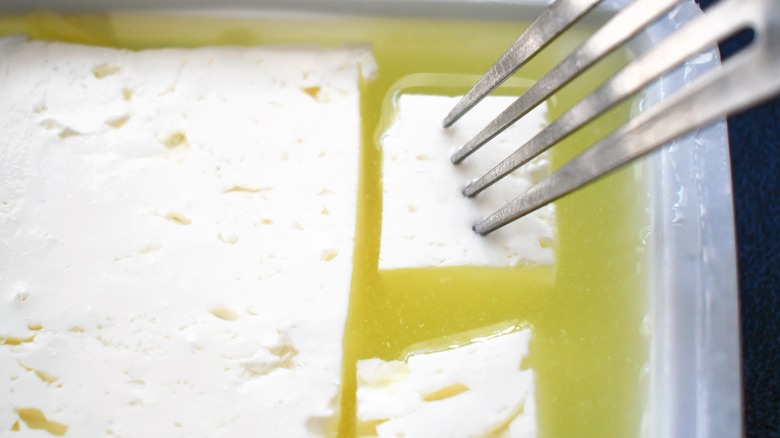Keep Your Feta Cheese Creamy And Fresh With This Simple Storage Tip
Whether you enjoy chunks of feta straight from the container or prefer to crumble the creamy cheese over salads and into bejeweled baked spreads, we can all agree that feta is delicious. So, it's only natural that we share the same sad sentiment when the once-velvety cheese becomes prematurely parched and unpleasantly brittle. Luckily, there is one very important storage tip that will ensure that feta remains its freshest and creamiest for longer. All you need to do is keep the feta bathed in brine.
Brine is essential to the longevity of feta. The salty liquid not only hinders microbial growth, but it prevents quality from becoming compromised as it helps feta preserve its tangy taste and retain moisture, which allows the cheese to remain lusciously soft. If you happen to purchase vacuum-sealed or dry-packed feta, however, all hope isn't lost. With the exception of crumbled cheese, dry-packed feta can still benefit drastically from being kept in brine. Simply whisk one and a half teaspoons of salt and one cup of water together before pouring the liquid into a container and plunging in blocks of "thirsty" feta.
To ensure the best results, we also suggest replacing the brine frequently. Ideally, murky-looking liquid should be refreshed every few days — don't worry, there are dozens of uses for all that leftover brine. Additionally, be sure to store the feta in an airtight container in the fridge as this will minimize the risk of oxidation and slow the rate of spoilage, respectively.
A brine bath keeps feta fresh for weeks
The good news is that storing feta in brine won't just restore and improve the overall quality of feta, it also dramatically extends the shelf life of the cheese. Generally, dry-packed feta only lasts a matter of days once it has been opened. By storing the same block (or cubes) of feta in brine, the cheese can instead last for months — 6 months, to be exact. That said, there are a couple of stipulations surrounding this timeframe. For example, in addition to continually refreshing the saltwater brine, it's also important to create an environment that's void of potential contaminants by not touching the cheese with dirty utensils or fingertips so as to limit the proliferation of bacteria that could prompt spoilage.
Despite that a brine-filled container of feta will keep in optimal condition for longer than its drier counterparts, nothing lasts forever. Some key signs of spoilage to be aware of include pungently sour, borderline rancid, or even yeasty aromas. Similarly, hardened as well as super slimy textures can also suggest that the cheese has passed its prime, much like yellowing or the presence of mold spots. In which case, feta should be tossed and replaced with something fresher. Just remember that whether you pick up a new block of dry or wet-packed cheese, feta should always be kept bathed in brine for the tastiest and most buttery bite possible!

